PETALING JAYA: With the fuel subsidy rationalisation programme kicking off two weeks ago, concerns about inflation have grown, particularly due to the impact on transportation costs for goods.
However, the government is mitigating these concerns by continuing to provide subsidised diesel to the logistics sector and monthly cash assistance to individuals.
This approach aims to reduce the pressure on consumer goods prices and lessen the impact on the public.
As a result, the government remains confident in achieving its headline inflation target of between 2% and 3.5% and a gross domestic product growth of between 4% and 5% for this year.
Echoing this sentiment, economist Professor Geoffrey Williams pointed out that diesel prices constitute only 0.2% of the basket of goods and services used to calculate Malaysia’s official inflation rate.
He noted that most people eligible for subsidies will continue to pay the old subsidised rate of RM2.15 per litre, implying minimal effect on future inflation.
“We have no other rationalisation plans so far. Inflation should remain moderate for most of the year,” he told StarBiz.
To note, the targeted diesel subsidy includes fleet cards for eligible logistics vehicles, maintaining low prices for public transport and fishermen and cash assistance of RM200 per month for individuals owning diesel vehicles and small-scale farmers.
However, UCSI University Malaysia associate professor of finance Liew Chee Yoong believes that these mitigation steps are not enough to keep inflation in check.
Consequently, he believes the rationalisation of diesel subsidies is likely to lead to a gradual increase in inflation.
He said businesses, especially in the agriculture and manufacturing sectors, will find it hard to sustain their cost structures.
“Unless companies or businesses compete with each other to maintain low prices or there is some sort of government intervention to maintain price stability, we will see a gradual increase in inflation across the board until the retail level,” said Liew, who is also a research fellow at the Centre for Market Education.
OCBC Asean senior economist Lavanya Venkateswaran.
Similarly, OCBC Asean senior economist Lavanya Venkateswaran believes there will be some upside pressure on inflation in the coming months following higher retail diesel prices.
According to the bank’s estimates, the adjustment of 55.8% higher to retail diesel prices, effective June 10, implies an additional 0.1 percentage points to annual inflation.
For June, OCBC’s Lavanya expects inflation to rise to 2.3% year-on-year (y-o-y) and maintains the full year 2024 average headline inflation forecast of 2.5% y-o-y.
“Our base case remains for Bank Negara to keep its policy rate unchanged at 3% for the rest of this year.
“The diesel subsidy rationalisation suggests that inflationary pressures will remain contained. Bank Negara will, however, remain vigilant of the second-round impact of price changes,” she noted.
Conversely, Williams argued that there should be no pass-through of costs to prices because those eligible for diesel subsidies will continue to receive them through fleet cards and quotas or the Budi Madani cash transfers.
“The main problem will be fake price hikes blaming the diesel subsidy rationalisation when it has nothing to do with that.
“Enforcement of anti-profiteering is essential, so consumers must report abuses, call it out publicly and stop buying from abusive companies.
“The government should support these activities among the general public,” he emphasised.
When asked how to mitigate the inflationary impact of subsidy rationalisation, Liew laid out several measures that the government could implement.
First, Liew said the government can continue to provide cash hand-outs to lower income groups to ensure affordability of basic needs.
Second, he said the government can temporarily enforce price ceilings on essential goods such as sugar, cooking oil, etc to prevent excessive price hikes which will burden the ordinary citizens.
Third, Liew suggested Bank Negara use inflation-targeting monetary policy measures by adjusting upwards the interest rate to control inflation in the country.
UCSI University Malaysia associate professor of finance Liew Chee Yoong.
“However, for how long the Malaysian government can intervene in the market to maintain price stability remains a question mark as it needs to exercise fiscal responsibility, which is precisely the reason for its implementation of the diesel subsidy rationalisation, as well as to exercise prudent monetary policy and implementing market-oriented policies,” he noted.
Yesterday, the Statistics Department reported that Malaysia’s inflation edged up to 2% in May compared to 1.8% in April.
The index points recorded were 132.8 against 130.2 in the same month of the previous year.
The increase in inflation was driven by a rise in the costs of housing, water, electricity, gas and other fuels, which rose by 3.2% compared to 3% in April.
Chief Statistician Datuk Seri Dr Mohd Uzir Mahidin attributed this increase to the subgroup of water supply and miscellaneous services relating to the dwelling, which rose by 32.1%.
“This is in tandem with the increase in water tariff rates for domestic category users in Perak starting May 2024,” he noted in a statement in conjunction with the country’s monthly consumer price index (CPI) update.
Moreover, inflation for restaurant and accommodation services increased to 3.2% from 3.5% in April due to an increase in the beverage preparation services subgroup to 4.1% from 3.9% in April.
Inflation for personal care, social protection and miscellaneous goods and services increased by 3% in May 2024 compared to 3.1% in April.
“The incline was contributed by the expenditure class of jewellery and watches at 16.5%,” he added.
Regarding inflation at the state level, Mohd Uzir said most states recorded increases below the national inflation level of 2%.
However, four states recorded increases above the national level – Pulau Pinang at 3.3%, Sarawak at 2.8%, Pahang at 2.6%, and Selangor at 2.4%.
Core inflation in May 2024, meanwhile, increased by 1.9%, the same rate as recorded in April 2024, driven by increases in restaurant and accommodation services and food and beverages groups.

